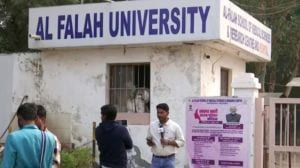Stay updated with the latest - Click here to follow us on Instagram
Vijay Mallya extradition case: Final hearing to start today in London court
If the Westminster Magistrates' Court in London rules in favour of the Indian government, the UK Home Secretary will have two months to sign Mallya's extradition order
 Last week, a Delhi court declared Mallya a ‘proclaimed offender’ for evading summons in a FERA violation case. (File Photo)
Last week, a Delhi court declared Mallya a ‘proclaimed offender’ for evading summons in a FERA violation case. (File Photo)
Will embattled liquor tycoon Vijay Mallya be extradited to India to face money laundering allegations worth Rs 9,000 crore involving his now-defunct Kingfisher Airlines or not? This will be the question on everyone’s mind with the businessman set to appear at Westminster Magistrates’ Court in London on Thursday for the final hearing in the case.
Judge Emma Arbuthnot will determine the “admissibility” of the evidence presented by the Indian government, following which she will set a schedule for the closing arguments and set a date for the verdict. If she rules in favour of the Indian government, the UK Home Secretary will have two months to sign Mallya’s extradition order.
Only last week, a Delhi court declared Mallya a “proclaimed offender” for evading summons in a FERA violation case. The Chief Metropolitan Magistrate (CMM) Deepak Sehrawat had directed the ED to start the process under Section 83 of the Criminal Procedure Code — attachment of property of person absconding — and fixed the next date of hearing on March 27.
ALSO READ: FERA violation case: Court declares Vijay Mallya ‘proclaimed offender’
Mallya’s defence team, led by barrister Clare Montgomery, has doubted the evidence given by the Indian authorities and had said there were a dozen documents submitted that read like an identical “template”. Judge Arbuthnot had also sought clarifications regarding facilities and medical assistance at Barrack 12 of Mumbai Central Prison on Arthur Road, where Mallya will be held if he is extradited from Britain.
The condition of the prison cell where Mallya would be kept was a major contention between the defence and prosecution. Witness Alan Mitchell, Her Majesty’s Prison Inspector for Scotland and an expert in international prison conditions, had said he was not convinced there would be enough natural light in the cell and described some Indian prisons as “pathetic” and infested with rats, cockroaches and snakes.
However, the Indian government told the judge that Mallya would be held in a relatively spacious cell if he is sent back to answer the allegations against him. Mark Summers, working with Indian prosecutors, said Mallya – who suffers from diabetes, coronary artery disease and a sleep disorder – would have a clean cell and access to medical care and also would be given ample time to exercise.
Earlier in the trial, the role of the CBI had come under the court’s scanner prompting the CPS to take political economist Lawrence Saez, a professor in the department of politics at the School of Oriental and Asian Studies (SOAS) in London, to task during his expert statement for the defence. As part of his witness statement, Saez had claimed that Mallya was being “unfairly persecuted on account of his high profile corporate persona” and being “unfairly targeted” by political parties trying to lobby for political gains against each other.
The extradition trial opened at the London court on December 4. While the prosecution’s stand is that Mallya did not intend to repay the loans he sought because his airline’s demise was inevitable, Montgomery is trying to establish that Kingfisher Airlines was suffering from consequences of a wider global financial crisis. Mallya was arrested by Scotland Yard on an extradition warrant in April, 2017 and has been out on bail on a bond worth 650,000 pounds.
(With PTI inputs)







